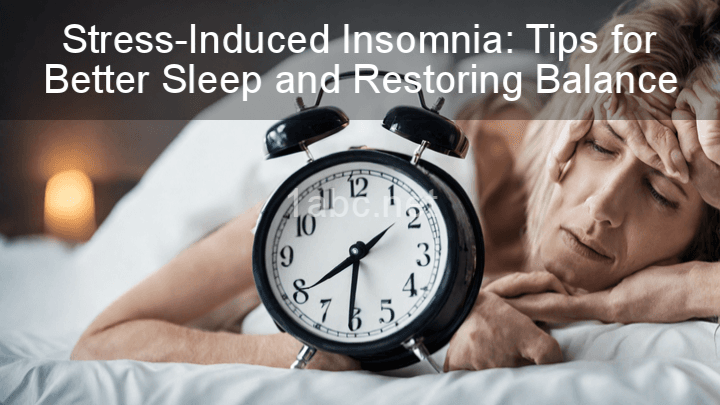Stress-Induced Insomnia: Tips for Better Sleep and Restoring Balance

Introduction:
Welcome to our blog, where we understand the struggles of stress-induced insomnia and offer support and solutions. We acknowledge that quality sleep is vital for overall well-being and want to help you find ways to improve your sleep and restore balance in your life.
I. Understanding Stress-Induced Insomnia
Stress-induced insomnia refers to the difficulty in falling asleep or staying asleep due to heightened stress levels. It is a common issue faced by many individuals in today's fast-paced and demanding world. Stress can stem from various sources, such as work pressure, relationship problems, financial concerns, or health issues. When stress becomes overwhelming, it can disrupt sleep patterns, leaving you feeling tired and drained.
II. The Impact of Stress on Sleep Quality
Inadequate sleep can have severe consequences on mental, emotional, and physical health. When stress-induced insomnia persists, it can lead to a range of negative effects. Mentally, you may experience difficulty concentrating, memory problems, and decreased cognitive function. Emotionally, you may feel irritable, anxious, or depressed. Physically, sleep deprivation can weaken your immune system, increase the risk of chronic conditions like heart disease and diabetes, and even impair your ability to lose weight.
III. Tips for Improving Sleep During Stressful Times
A. Creating a Relaxing Pre-Bedtime Routine
- Limit screen time before bed: The blue light emitted by electronic devices can suppress the production of melatonin, a hormone that regulates sleep. Avoid using screens at least an hour before bedtime.
- Engage in calming activities: Reading a book, taking a warm bath, or practicing gentle stretching can help relax your mind and body, preparing you for a restful sleep.
- Practice relaxation techniques: Deep breathing exercises, meditation, or guided imagery can help calm your racing thoughts and ease tension before sleep.
B. Establishing a Sleep-Friendly Environment - Ensure a comfortable sleep environment: Create a bedroom that is conducive to sleep by maintaining a cool temperature, reducing noise levels, and blocking out excessive light.
- Invest in a supportive mattress and pillows: A comfortable and supportive sleep surface can greatly enhance the quality of your sleep.
- Consider using white noise or relaxation apps: If external noises or racing thoughts keep you awake, try using white noise machines or relaxation apps with soothing sounds to promote a more peaceful sleep environment.
C. Adopting Healthy Lifestyle Habits - Regular exercise: Engaging in physical activity during the day can help reduce stress levels and promote better sleep. However, avoid intense workouts close to bedtime, as they can increase alertness and make it harder to fall asleep.
- Balanced diet with limited caffeine intake: Be mindful of what you eat and drink, especially in the evening. Minimize caffeine consumption, as it is a stimulant that can interfere with sleep.
- Avoid excessive alcohol consumption before bedtime: Although alcohol may initially make you feel drowsy, it can disrupt the sleep cycle and lead to fragmented and less restorative sleep.
D. Managing Stress Levels during the Day - Identify stress triggers and develop coping mechanisms: Understanding what causes your stress and finding healthy ways to manage it is essential. Whether it's through talking to a friend, practicing mindfulness, or engaging in a hobby, find what works best for you.
- Practice time management techniques: Prioritize your tasks, delegate when possible, and learn to say no. By managing your time effectively, you can reduce daily pressures and create more time for relaxation and self-care.
- Seek support from loved ones or professional help if needed: Don't hesitate to reach out to family and friends for emotional support. If stress and insomnia persist or worsen, consider seeking help from a healthcare professional or sleep specialist who can provide personalized guidance and treatment options.
IV. Seeking Professional Help When Needed
While the tips mentioned above can be beneficial for many individuals, it's important to note that everyone's situation is unique. If self-help strategies do not improve your sleep or if stress-induced insomnia becomes chronic and significantly impacts your daily life, consulting with a healthcare professional or sleep specialist is recommended. They can conduct a thorough evaluation, identify any underlying issues, and provide appropriate treatment options tailored to your needs.
Conclusion:
In conclusion, stress-induced insomnia can be a challenging and exhausting experience. However, with persistence and a proactive approach, you can overcome it and restore balance in your life. By understanding the causes of stress-induced insomnia and implementing the tips provided, such as creating a relaxing pre-bedtime routine, establishing a sleep-friendly environment, adopting healthy lifestyle habits, and managing stress levels during the day, you can improve your sleep quality and overall well-being.
Remember, seeking professional help is always an option if self-help tips do not provide the desired results. Sleep is a fundamental aspect of a healthy life, and by prioritizing it, you can find the peace and restful sleep you deserve. With dedication and support, you can conquer stress-induced insomnia and regain control of your sleep and overall well-being. Sweet dreams!
FREQUENTLY ASKED QUESTIONS
What is stress-induced insomnia?
Stress-induced insomnia refers to difficulty falling asleep or staying asleep that is caused by excessive stress. When individuals experience high levels of stress, it can disrupt their ability to relax and calm their minds before bed, leading to insomnia. Stress-induced insomnia can also result in early morning awakenings or restless, fragmented sleep patterns. It is important to manage stress effectively to promote better sleep and overall well-being.
How does stress affect sleep?
Stress can have a significant impact on sleep. When an individual is stressed, their body releases stress hormones like cortisol. These hormones can interfere with the natural sleep-wake cycle, making it difficult to fall asleep or stay asleep throughout the night.
Stress can also result in racing thoughts, worries, and anxiety, making it challenging to relax and quiet the mind before bedtime. This can lead to insomnia, where individuals struggle to initiate or maintain sleep.
Additionally, stress can disrupt the quality of sleep, causing more frequent awakenings during the night and leading to poor sleep overall. As a result, individuals may feel tired, groggy, and have difficulty concentrating during the day.
By managing stress through techniques such as exercise, relaxation exercises, and stress reduction strategies, individuals can improve their sleep quality and promote a more restful night's sleep.
What are the symptoms of stress-induced insomnia?
Symptoms of stress-induced insomnia can vary from person to person, but some common signs include:
- Difficulty falling asleep: Insomniacs often have trouble initiating sleep due to an overactive mind or racing thoughts caused by stress.
- Waking up frequently during the night: Stress can disrupt sleep, causing individuals to wake up multiple times throughout the night and struggle to return to sleep.
- Early morning awakenings: Insomnia caused by stress may lead to waking up earlier than planned and being unable to go back to sleep.
- Feeling unrested after sleep: Despite spending an adequate amount of time in bed, individuals with stress-induced insomnia often wake up feeling tired and unrefreshed.
- Fatigue and low energy levels: Chronic sleeplessness can result in ongoing fatigue, decreased energy, and an overall lack of motivation.
- Irritability and mood disturbances: Insufficient sleep due to stress can affect one's mood and emotional well-being, leading to irritability, mood swings, and increased anxiety.
- Difficulty concentrating and remembering: Insomnia can impair cognitive function, making it challenging to concentrate, focus, and retain information.
- Physical symptoms: Stress-induced insomnia can manifest in physical symptoms such as headaches, muscle tension, and gastrointestinal issues.
It is important to note that if you are experiencing symptoms of insomnia or any other health condition, it is best to consult a medical professional for an accurate diagnosis and appropriate treatment.
How can stress-induced insomnia impact my overall health?
Stress-induced insomnia can have detrimental effects on your overall health. Lack of sleep can weaken your immune system, making you more susceptible to illnesses and infections. It can also negatively impact your mental health, leading to increased anxiety, depression, and irritability. Sleep deprivation can affect your cognitive function, making it difficult to concentrate and make decisions. It can also contribute to weight gain, as it disrupts the regulation of appetite hormones. Additionally, chronic insomnia has been linked to an increased risk of developing conditions such as cardiovascular disease, diabetes, and certain types of cancer. Therefore, it is important to address and manage stress-induced insomnia to protect your overall health and well-being.




